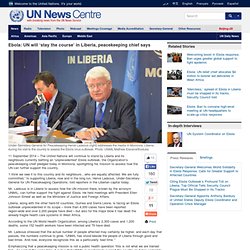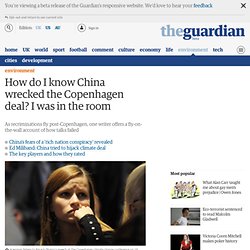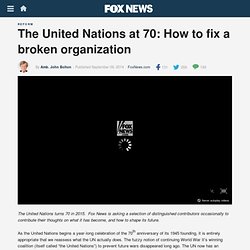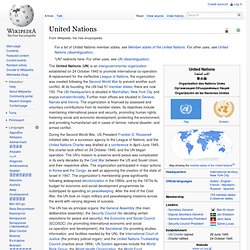

Ebola: UN will ‘stay the course’ in Liberia, peacekeeping chief says. 11 September 2014 – The United Nations will continue to stand by Liberia and its neighbours currently battling an “unprecedented” Ebola outbreak, the Organization’s peacekeeping chief pledged today in Monrovia, spotlighting his mission to assess how the UN can further support the country.

“I think we owe it to this country and its neighbours…who are equally affected. We are fully committed,” to supporting Liberia, now and in the long run, Hervé Ladsous, Under-Secretary-General for UN Peacekeeping Operations, told reporters in the Liberian capital today. Mr. Ladsous is in Liberia to assess how the UN mission there, known by the acronym UNMIL, can further support the fight against Ebola. He held meetings with President Ellen Johnson Sirleaf as well as the Ministers of Justice and Foreign Affairs. According to the UN World Health Organization, among Liberia’s 2,300 cases and 1,200 deaths, some 152 health workers have been infected and 79 have died.
Mr. Further, Mr. How do I know China wrecked the Copenhagen deal? I was in the room. Copenhagen was a disaster.

That much is agreed. But the truth about what actually happened is in danger of being lost amid the spin and inevitable mutual recriminations. The truth is this: China wrecked the talks, intentionally humiliated Barack Obama, and insisted on an awful "deal" so western leaders would walk away carrying the blame. How do I know this? Because I was in the room and saw it happen. China's strategy was simple: block the open negotiations for two weeks, and then ensure that the closed-door deal made it look as if the west had failed the world's poor once again. All very predictable, but the complete opposite of the truth. Sudan behaves at the talks as a puppet of China; one of a number of countries that relieves the Chinese delegation of having to fight its battles in open sessions. Here's what actually went on late last Friday night, as heads of state from two dozen countries met behind closed doors. What I saw was profoundly shocking. Shifting the blame China's game.
The United Nations at 70: How to fix a broken organization. The United Nations turns 70 in 2015.

Fox News is asking a selection of distinguished contributors occasionally to contribute their thoughts on what it has become, and how to shape its future. As the United Nations begins a year-long celebration of the 70th anniversary of its 1945 founding, it is entirely appropriate that we reassess what the UN actually does. The fuzzy notion of continuing World War II’s winning coalition (itself called “the United Nations”) to prevent future wars disappeared long ago. The UN now has an extensive real-world record to evaluate, rather than merely its founders’ aspirations. Some drastic changes are clearly in order. The UN system today is a huge operation, defying orderly analysis, which is precisely one of its biggest problems. In many often-unknown or overlooked UN specialized agencies and programs, considerable important technical or humanitarian work is being done.
Reform efforts have proven unsuccessful or even counterproductive. United Nations. The United Nations (UN) is an intergovernmental organization established on 24 October 1945 to promote international co-operation.

A replacement for the ineffective League of Nations, the organization was created following the Second World War to prevent another such conflict. At its founding, the UN had 51 member states; there are now 193. The UN Headquarters is situated in Manhattan, New York City and enjoys extraterritoriality. Further main offices are situated in Geneva, Nairobi and Vienna. The organization is financed by assessed and voluntary contributions from its member states. During the Second World War, US President Franklin D. The organization won the Nobel Peace Prize in 2001, and a number of its officers and agencies have also been awarded the prize. History Background and creation Cold War era Dag Hammarskjöld was a particularly active Secretary-General from 1953 until his death in 1961. Post-Cold War Structure Principal organs of the United Nations[52] General Assembly. Welcome to the United Nations.